
| Darin McQuoid | Blog | Reviews | Tutorials | River Directory |
Grand
Canyon of the Stikine
V-V+
V-V+
Day
Three
In many ways the third day of the Stikine is the inverse of the second day. The second has many rapids, few of which are scouted or can be portaged. On the third day every rapid is named, but there aren't as many of them and all but one can be portaged.
Facing a massive exodus back to California on a time schedule, we arose early for the day. Our campsite under the overhang was not frozen, which helped us motivate. Once on the beach though, temperatures were the same if not colder than the previous day. I chipped the ice out of my kayak and seal launched in. I was aghast as a thin sheet of water partially froze to the deck of my boat. Good thing I brought pogies!
Thankfully
on the start of the third
day the canyon is open and let in
some sunlight, making it feel warm.
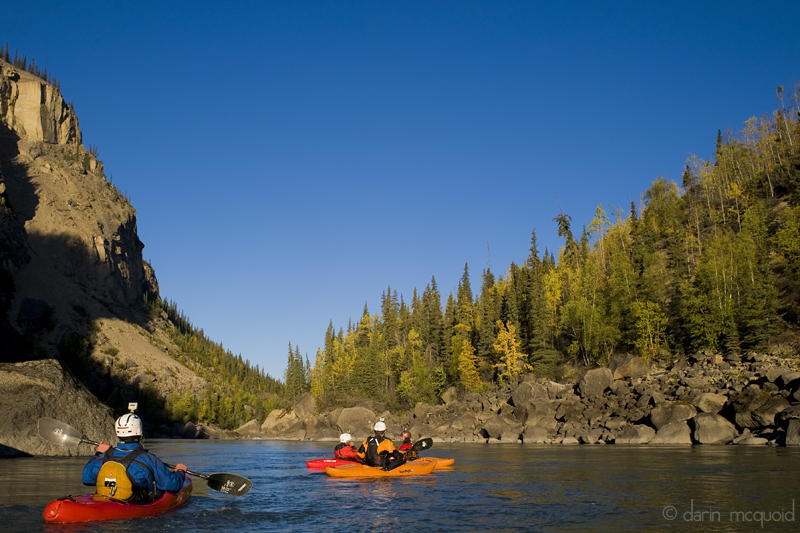

Sunlight stayed with us as we scouted the first rapid of day three: The Wall 2. Good morning, good light, good adrenaline: the start of a cold day.
Rush
Sturges gets day three going on
The Wall 2
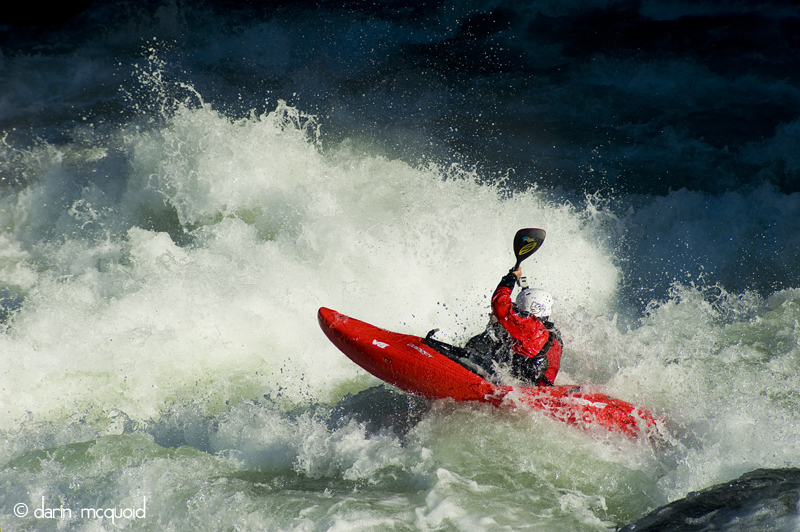

A
nice big wave train with a crashing
wave hole at the bottom...Corey
Boux The Wall 2.
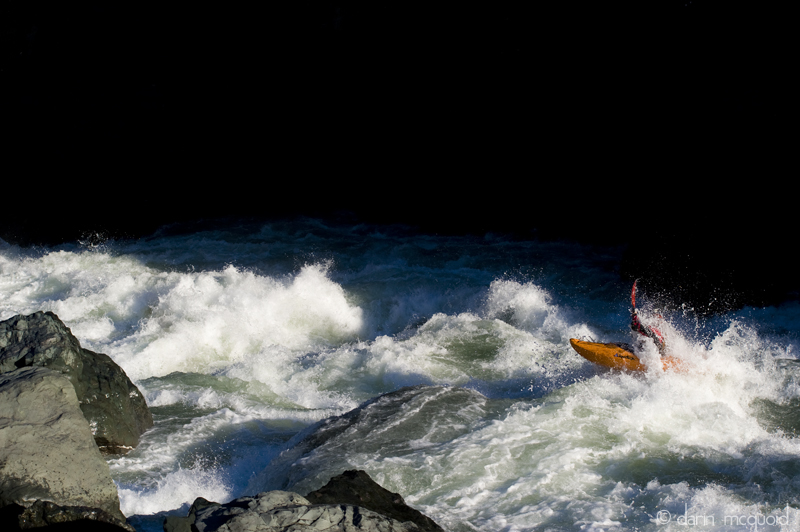

In
the morning it had seemed like we
were out of the canyon and in the
open. Not quite. Below The Wall 2 the canyon was back in Grand Canyon
status and we were insignificant.
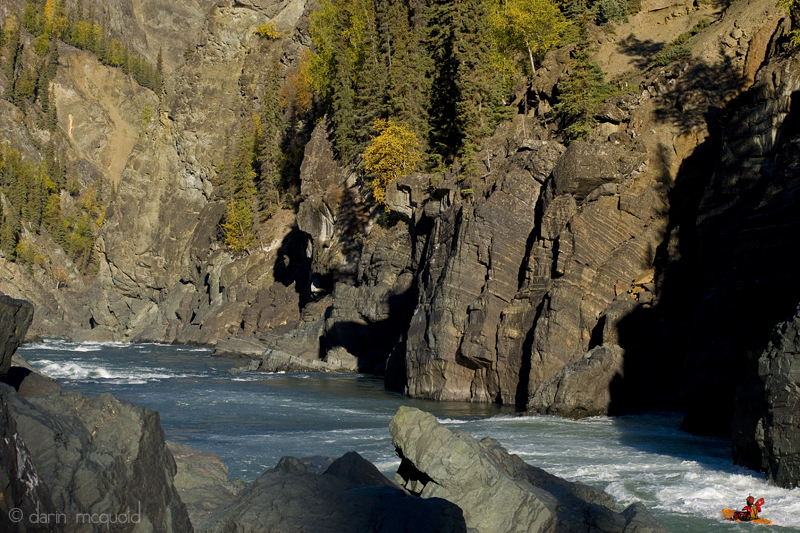

A short bit of whitewater had us out again at Scissors. I am one, scared of Scissors thinking of Gerry Moffatt's infamous close call and second, curious about how it got it's name.
I'm still not sure of how Scissors was originally named. At our lower flow Gerry's rock was out of play, but a massive hole flushed into two rocks, reminiscent of an open pair of scissors. The two rocks funneled the water right into a two foot wide crack between them. We all agreed that you'd probably go through. As long as you weren't sideways. Probably. Nodding my head to Gerry and respect for the river and saving one for next time, I decided to walk scissors.
Rush
Sturges gives it a go.
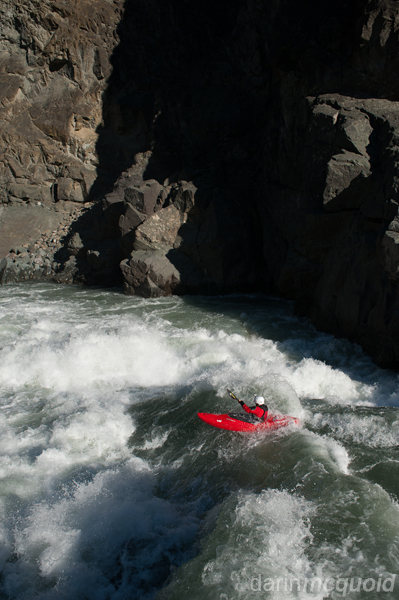

As often happens in Scissors, the hole flipped Rush and he came closer than comfortable to the rocks, making me feel better about having my tail between my legs. Below Scissors we ran several large constricted cataracts, most of them were fast wave trains around blind corners. Nice to know that someone up front has an idea of what is around the corners! Several metal gauges marked the bank in this section, a reminder of how close the canyon came to being inundated.
Our next scout was for the Hole That Ate Chicago. I was looking forward to this one, a big hole that goes right through on the left...at the right flows. Unfortunately we didn't have the right flows for it, and not much was going through. If it had a big pool at the bottom, I don't doubt we would have given it hell. Instead of a large pool, V-Drive, the largest rapid of the Stikine would have to be swum. No thanks.
Our
team makes a quick portage of The
Hole That Ate Chicago.
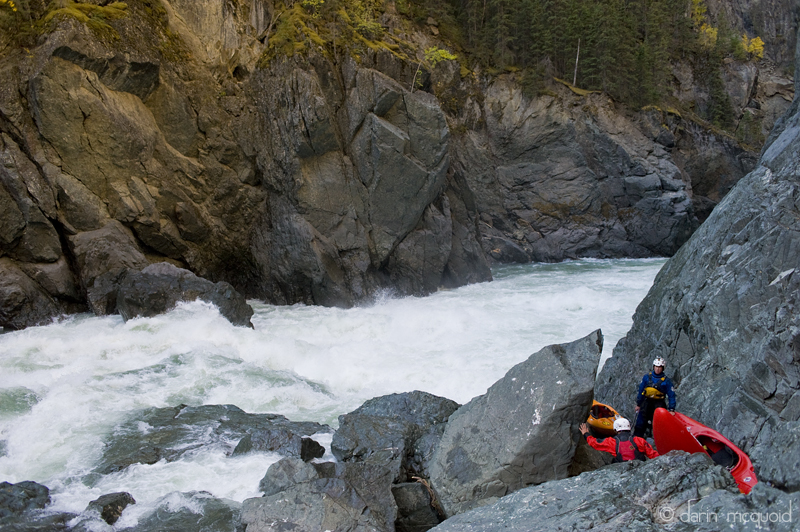

V-Drive is massive. Portaging on the right is an undertaking of equal size. Normally it's good to go down the center, but we'd talked to a group who had been in at low flows before us and they portaged it. The scout is high above on the right. So high up it gave us no scale of the drop that happens in V-Drive. Portaging on the left like the lower flow group looked terrible. Well the portage looked good. The ferry out and off the left wall did not. Even if you got stuffed in the rapid it looked like you'd end up at a better spot than from the left portage.
Locked
in: the pool between the
Chicago eating hole and V-Drive.
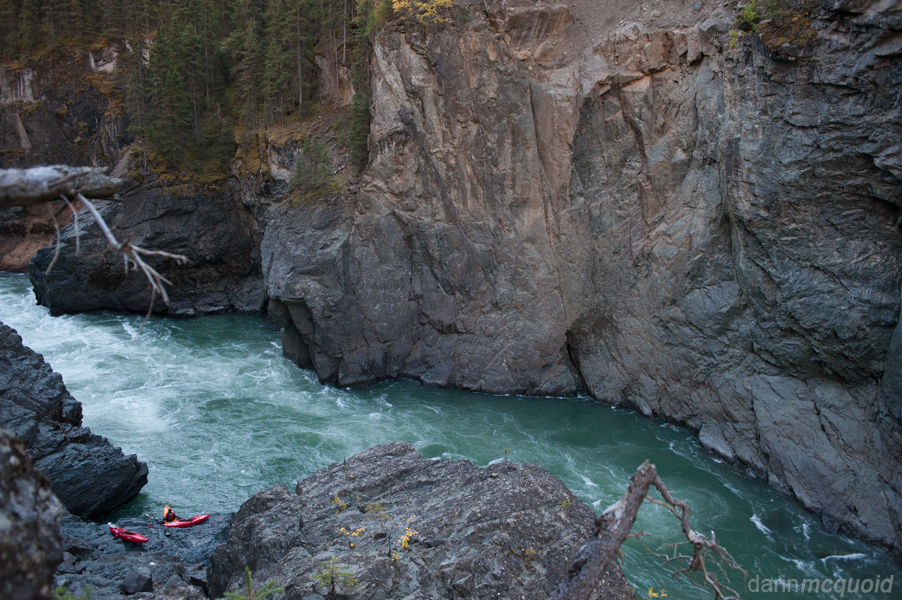

Corey
Boux and Charlie Center decide
to go first. Corey is down in the
hole there somewhere.
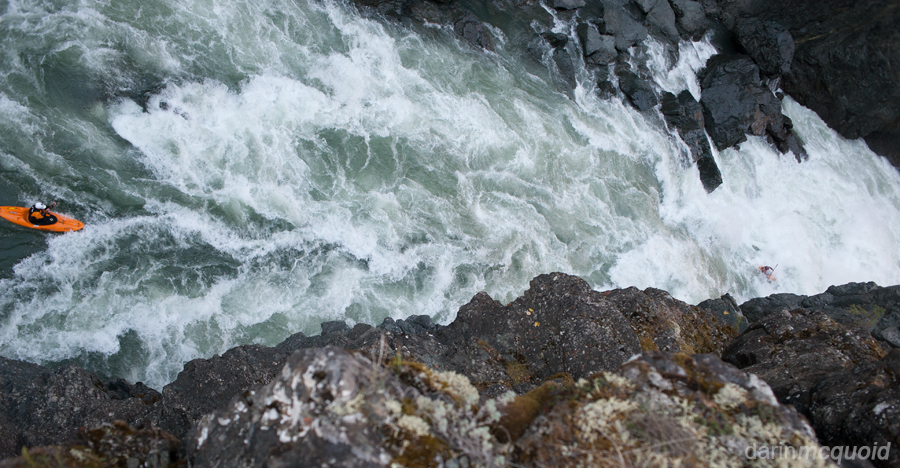

Corey and Charlie both vanished into the big crashing hole but came right through and paddled off the left wall. No one wanted to go alone, but I wanted to get another photo of V-Drive so I'd either have to go last or someone would go solo. It's a strange thing about big water, the other person out there won't really help you, but somehow it feels much safer paddling in pairs. Jonas said he'd take one for the team and headed to his boat while Rush and I switched angles.
Jonas
Grunwald: V-Drive
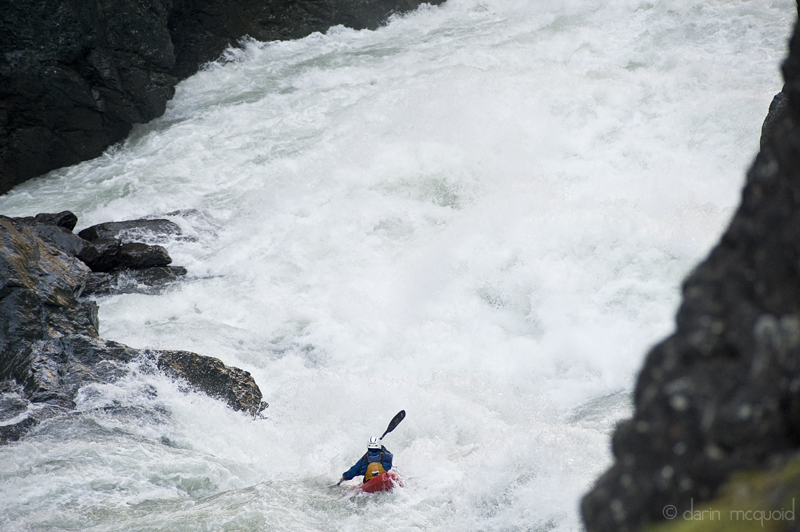

Scouting from above and watching video, it's just not apparent how much V-Drive drops. The whole volume of the river drops around thirty feet over the final ramp into the hole. It's very fast and quite exciting.
Jonas
Grunwald getting through some
hydraulics.
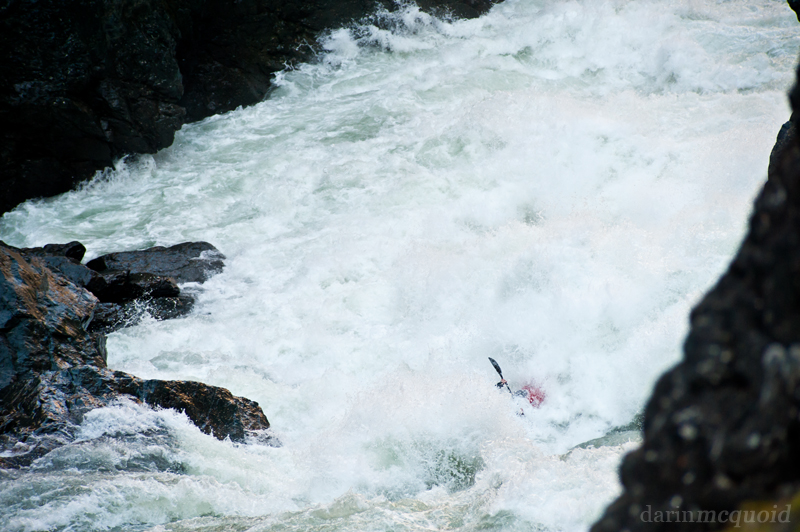

Rush and I were silent while packing up our camera gear. I had the perfect mix of excitement and apprehension. We peel out of the eddy close together. Rush had a GoPro on so I assumed I was going first, and he assumed the opposite. We quickly switched positions dropping in. At the peak of each wave I watched for a wave hole on the right, once past it I'd drive hard right. The wave hole flew by and I drove to the right, gaining speed down the ramp and then all whiteout, hold on and roll up, stay off the wall and give a big cheer.
Then it's over. There are one or two large rapids in the paddle out, but nothing walled in or as big.
Charlie
Center and the confluence with
the Tanzilla River.
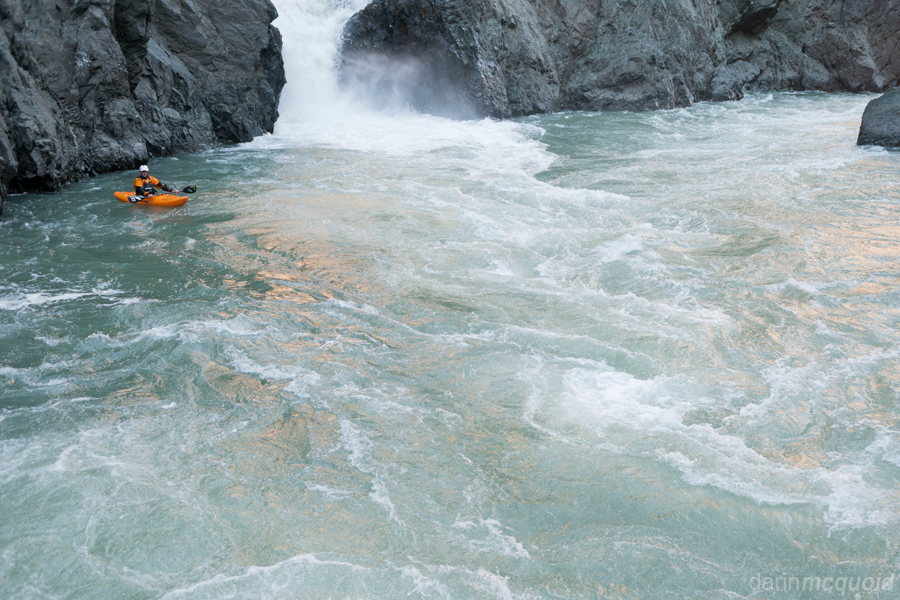
Tanzilla slot was every bit as tight as promised. Unbelievable for so much water to squeeze through something so small.
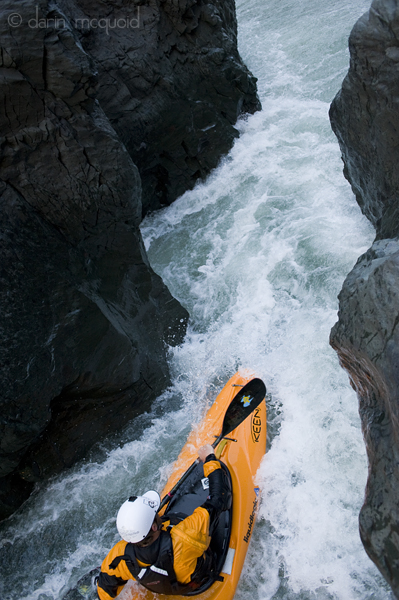

Tanzilla slot was every bit as tight as promised. Unbelievable for so much water to squeeze through something so small.

I'd
been told the Stikine basically
had no flat water. Don't believe
that, it does have a paddle out.
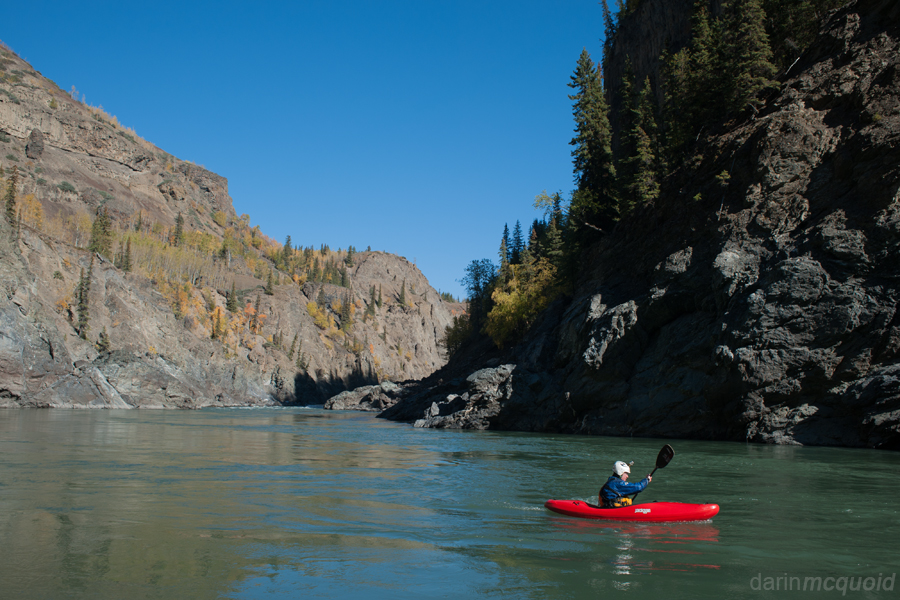

Enthusiasm
dampened by the
chilly weather we were all quiet at
take out. It would take more than a few minutes to process such an
incredible place. Successful trip on a beautiful river. Time to head
home.
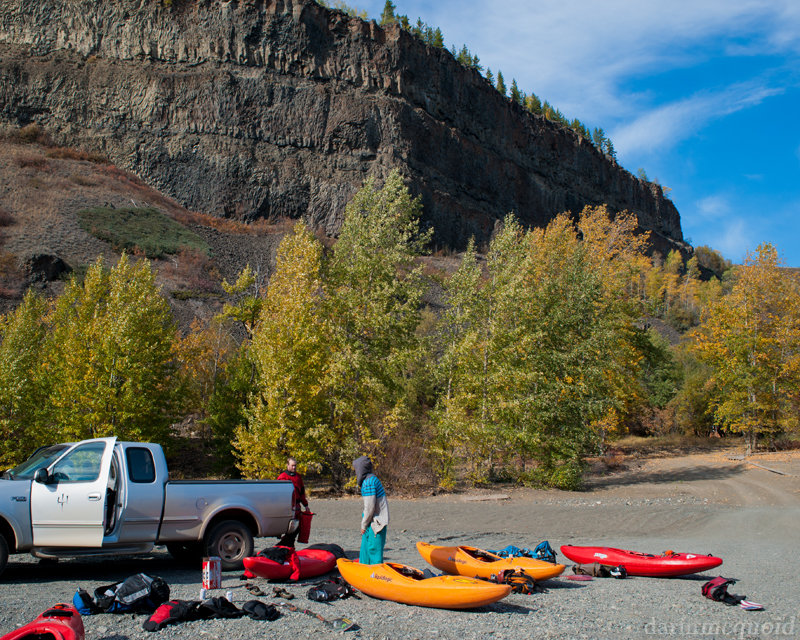

The Stikine is the finest big water class V in North America. If you haven't paddled big water class V before it will be terrifying. With a good team and experience, it is a true joy to run, but key to remember that mistakes are not easily forgiven by the Stikine
We had flows around 250cms (8,800cfs) for our whole trip. While some of the in between sections were easier, both veterans agreed that The Wall and V-Drive, two of the largest mandatory rapids, were tougher.
Telegraph Take Out on Google Maps